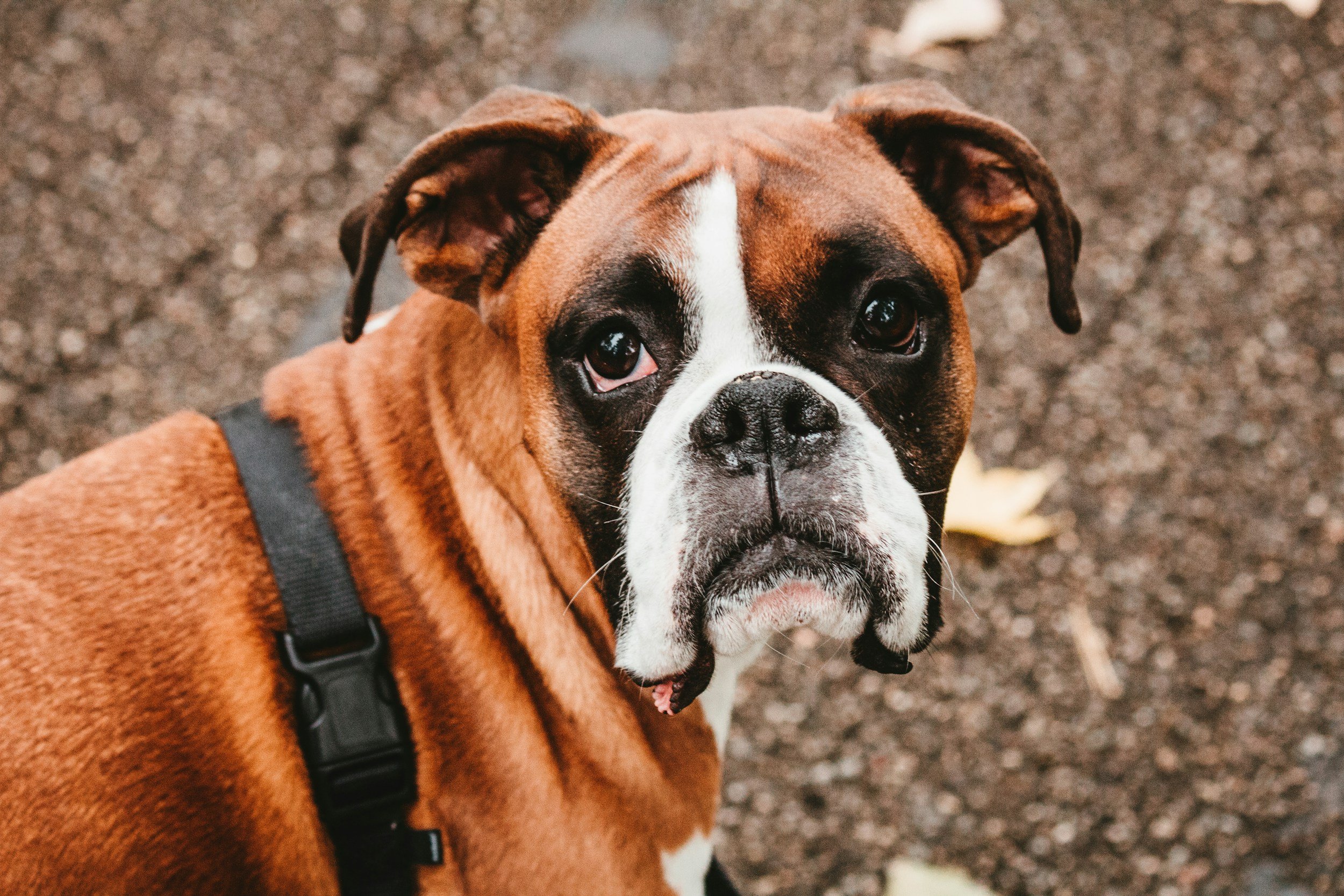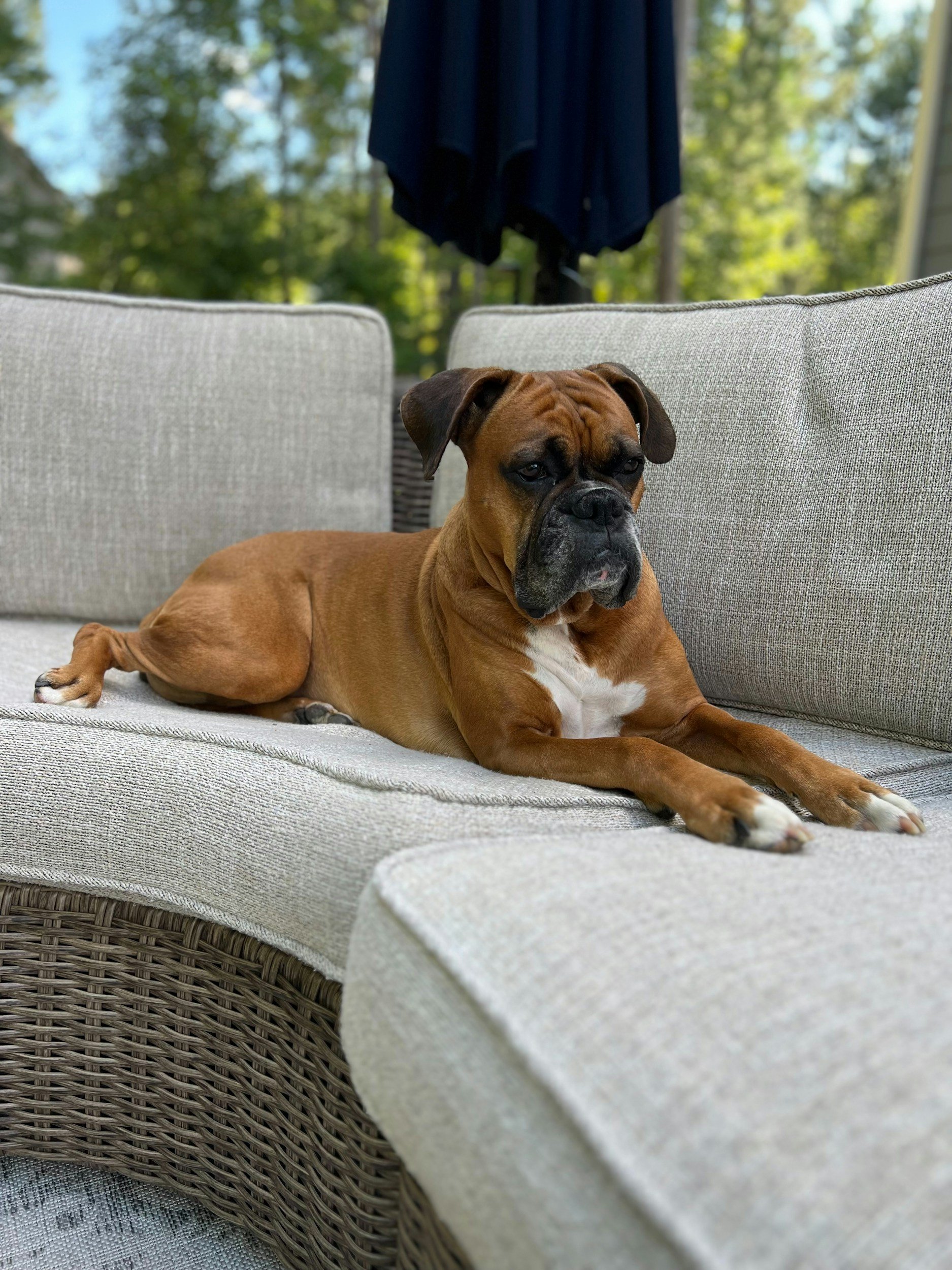
Boxer
The Boxer is a medium to large-sized breed that originated in Germany during the late 19th century. Bred from the now-extinct Bullenbeisser and crossed with Mastiffs, Bulldogs, and Great Danes, Boxers were initially used as hunting and working dogs. Today, they are known for their playful, energetic, and affectionate personalities. With their distinctive square muzzle and athletic build, Boxers have become popular family pets due to their loyalty, protectiveness, and high intelligence.
Fun Fact!
Boxers got their name from their unique way of using their front paws to “box” when they play or defend themselves!
Overall
Boxers are playful, loyal, and energetic dogs that make excellent companions for active individuals or families. They require regular exercise, training, and attention, but with proper care, they are loving and devoted pets that bring joy and protection to their homes.
Essential information
-
Qualities
Energetic and Playful
Boxers are highly energetic dogs that love to play, making them great companions for active households.
Loyal and Protective
They are fiercely loyal to their families and are natural protectors, making them excellent watchdogs.
Good with Children
Boxers are patient and playful with children, making them great family dogs.
Highly Intelligent
Boxers are quick learners and excel in obedience training, though they can be stubborn at times.
-
Considerations
High Exercise Needs
Boxers require a lot of physical activity to stay happy and healthy, which can be challenging for less active owners.
Prone to Health Issues
Boxers are prone to certain health issues, such as heart problems and cancer, which can lead to high veterinary costs.
Can Be Boisterous
Due to their high energy, Boxers can be boisterous, especially during play, which can be overwhelming for small children or older adults.
Not Ideal for Extreme Climates
Boxers have a short coat and are prone to overheating in hot weather and feeling cold in cooler climates.
-
Exercise & Training
Exercise Needs
Boxers are high-energy dogs that require regular, vigorous exercise to stay healthy and happy. They enjoy activities such as running, hiking, and playing fetch. Without enough physical and mental stimulation, Boxers may become bored and engage in destructive behaviours.
Walks
Boxers need at least two long walks or runs per day, along with playtime and mental stimulation. They also enjoy participating in dog sports like agility, obedience, or even working as service dogs due to their intelligence and athleticism.
Training
Boxers are intelligent and eager to please, but they can also be stubborn and independent. Early obedience training is essential to ensure they grow into well-behaved adults. Positive reinforcement methods work best, and consistency is key. Boxers thrive in environments where they receive both mental and physical challenges.
-
Cost
Purchase Price
$3,000 - $5,500 AUD depending on breeder and lineage.
Initial Setup
Around $400 - $700 AUD. (crate, bed, toys, etc.)
Food
Approximately $1,000 - $1,500 AUD per year, depending on dietary needs and size.
Grooming
Minimal grooming costs, typically around $200 - $400 AUD per year. Their short coat only requires regular brushing, but occasional baths help maintain cleanliness.
Vet Bills
Initial vaccinations, microchipping, and desexing can cost around $600 - $1,000 AUD. Ongoing annual check-ups and preventive care could cost $500 - $1,000 AUD per year, with additional costs for managing potential health issues like heart conditions or cancer.
Total Lifetime Cost
Over a 10-12 year lifespan, the total cost of ownership can range from $25,000 - $45,000 AUD, depending on health and lifestyle factors.
-
Characteristics
Size and Weight
Boxers typically stand 53-63 cm (21-25 inches) tall and weigh between 25-32 kg (55-70 lbs), with males generally being larger than females.
Coat
Boxers have a short, sleek coat that is easy to maintain. They shed moderately throughout the year, and regular brushing helps keep their coat healthy.
Colour Options
Boxers come in various colours, including fawn, brindle, and white. Some Boxers have distinctive white markings on their chest, face, and legs.
Temperament
Boxers are known for their playful, friendly, and protective nature. They are affectionate with their families and often form strong bonds with their owners. They are also known to be a bit goofy, with an exuberant personality that makes them entertaining companions. Boxers are natural guardians and will alert their owners to any perceived threats.
Good with Children
Boxers are typically excellent with children due to their playful and patient nature. They enjoy playing with kids but should be supervised with very young children due to their size and energy.
Socialisation
Early socialisation is essential for Boxers to ensure they are comfortable around new people, pets, and environments. Proper socialisation helps them develop into well-mannered adults and reduces the risk of over-protectiveness or shyness.
-
Living Environment Suitability
Indoors vs. Outdoors
Boxers prefer to live indoors with their families but need regular outdoor time for exercise and play. They are not suited to living outdoors full-time due to their short coat and strong desire for human companionship.
Apartment Living
Boxers can adapt to apartment living, but they need regular outdoor exercise and mental stimulation to prevent boredom. Their size and energy levels make them better suited to homes with access to outdoor spaces, but they can thrive in smaller homes if their exercise needs are met.
Time Alone
Boxers do not do well when left alone for long periods, as they are social dogs that enjoy being part of the family. They may develop separation anxiety or engage in destructive behaviours if isolated for extended periods. Boxers are best suited for homes where someone is present for most of the day.
-
Healthcare
Common Health Issues
Boxers are prone to certain health issues, including hip dysplasia, heart conditions (such as aortic stenosis), cancer, and bloat (gastric torsion). Regular vet check-ups, a balanced diet, and controlled exercise are crucial for maintaining their health. White Boxers are also prone to deafness.
-
Additional info
Guarding Ability
Boxers are naturally protective and make excellent guard dogs. They are alert and will often bark to warn their owners of strangers or unusual activity. Despite their playful nature, Boxers can be serious protectors when needed.
Affectionate Nature
Despite their tough appearance, Boxers are affectionate dogs that love spending time with their families. They enjoy being close to their owners and are often described as “velcro dogs” because they follow their humans around.
Suitability for Dog Parks
Boxers can be social with other dogs, but supervision is recommended in social settings like dog parks, especially when they are young. Early socialisation helps ensure positive interactions with other pets and reduces the risk of dominant behaviour.
Climate Adaptability
Boxers can struggle in extreme temperatures, particularly in hot climates. Their short coat makes them prone to overheating, so it’s important to provide plenty of water, shade, and avoid exercising them during the hottest parts of the day. In colder climates, they may need a dog jacket for warmth during winter months.
Ethical Breeding Considerations
Due to their predisposition to certain genetic conditions, such as heart disease and cancer, it is important to purchase from a reputable breeder who conducts health screenings. Ethical breeding practices help reduce the risk of hereditary health problems and ensure the well-being of the puppies.








